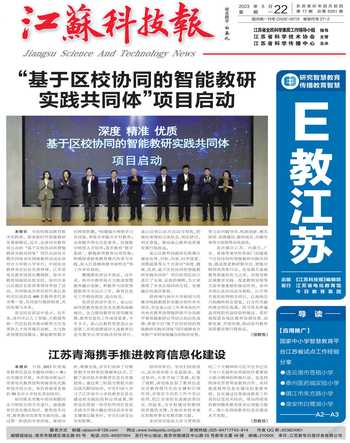2023年基礎教育創新驅動力報告: 技術篇(一)

INTRODUCTION
CoSNs Driving K-12 Innovation initiative convenes an international Advisory Board of about 100 education and technology experts to select the most important topics impacting teaching, learning, and education innovation around the globe — the top Hurdles (barriers), Accelerators (mega-trends), and Tech Enablers (tools) for the upcoming year. This publication focuses on the Top 3 Tech Enablers for 2023.
2023 TOP 3 TECH ENABLERS
1.ARTIFICIAL INTELLIGENCE
Interfaces that mimic the complexity and function of human brain processes, such as decision-making, learning, evolving, problem-solving, perceiving, and demonstrating creativity. Their capabilities and intelligence processes may be quite different from those of humans (consisting of algorithms, rules, data sets, etc. related to specific domains), but fulfill similar functions — sometimes surpassing human capabilities and sometimes outmatched by them. These technologies encompass machine learning, natural language processing, deep learning, computer perception, etc. As we move forward, we need to look at ethics surrounding the use of AI.
2.UNTETHERED BROADBAND & CONNECTIVITY
Ubiquitous broadband Internet and the underlying technologies that enable robust connected learning — without requiring devices to be physically connected (via cables, for example). These technologies enable mobility and learning anytime, anywhere.
3.RICH DIGITAL ECOSYSTEM
Connecting systems or digital environments can form powerful digital ecosystems for enabling student learning and/or supporting education administration. These interconnected systems of online and virtual spaces can span formal school settings and beyond.
EXPLORING THE 2023 TECH ENABLERS
1.BY IMPORTANCE
Top 3 most important Tech Enablers for education systems to leverage in 2023 (63 respondents),see Figure 1.
2.BY IMMEDIACY
Top 3 Tech Enablers in order of the immediacy of its adoption at scale by schools worldwide, as ranked by the Advisory Board (Scores reflect the average score out of 5, with 1 being the most immediate adoption; 5 being the furthest away from adoption; 63 respondents),see Figure 2.
譯文
簡介
由美國學校網絡聯合會(CoSN)負責的《2023年基礎教育創新驅動力報告》是由近100位教育和技術專家組成的國際咨詢委員會,對影響全球教學、學習和教育創新的主題——最重要的挑戰、趨勢和近期的技術驅動因素進行篩選、討論和分析整理得出的報告。本報告重點介紹2023年對基礎教育創新有重大意義的三大技術驅動因素。
2023年排名前三的技術驅動因素
1.人工智能
人工智能是指模擬人腦功能及其工作過程的技術,例如決策、學習、進化、解決問題、感知和創造。人工智能的容量和智能過程可能與人類大不相同(主要是由特定領域的相關算法、規則、數據集等組成),但具有人類大腦相似的功能,有時甚至超越人類的智能,但有時還不及人類。目前人工智能技術主要包括機器學習、自然語言處理、深度學習、計算機感知等。隨著人工智能的廣泛應用,我們需要進一步審視和關注使用人工智能的道德規范問題。
2.暢通無阻的寬帶及接入
無處不在的寬帶互聯網和基礎技術讓泛在學習成為可能。這些技術使隨時隨地的學習成為可能。
3.豐富的數字化生態
通過與系統或數字環境建立連接從而形成強大的數字生態系統,可以支持學生的學習以及教育行政管理,并利用這些互聯互通的在線虛擬空間拓展傳統的校園環境。
2023年技術驅動因素探索
1.按重要性排序
根據63名專家受訪者投票結果,得出2023年教育系統中最重要的三個技術驅動因素重要性排序,如圖1所示。
2.按技術落地實施的先后順序
咨詢委員會對全球學校大規模落地實施相關技術的難易程度進行排序,排在前三的技術如圖2所示(63名專家給出反饋,分數為平均分,滿分5分。1表示最先落地應用;5表示最后落地應用)。

